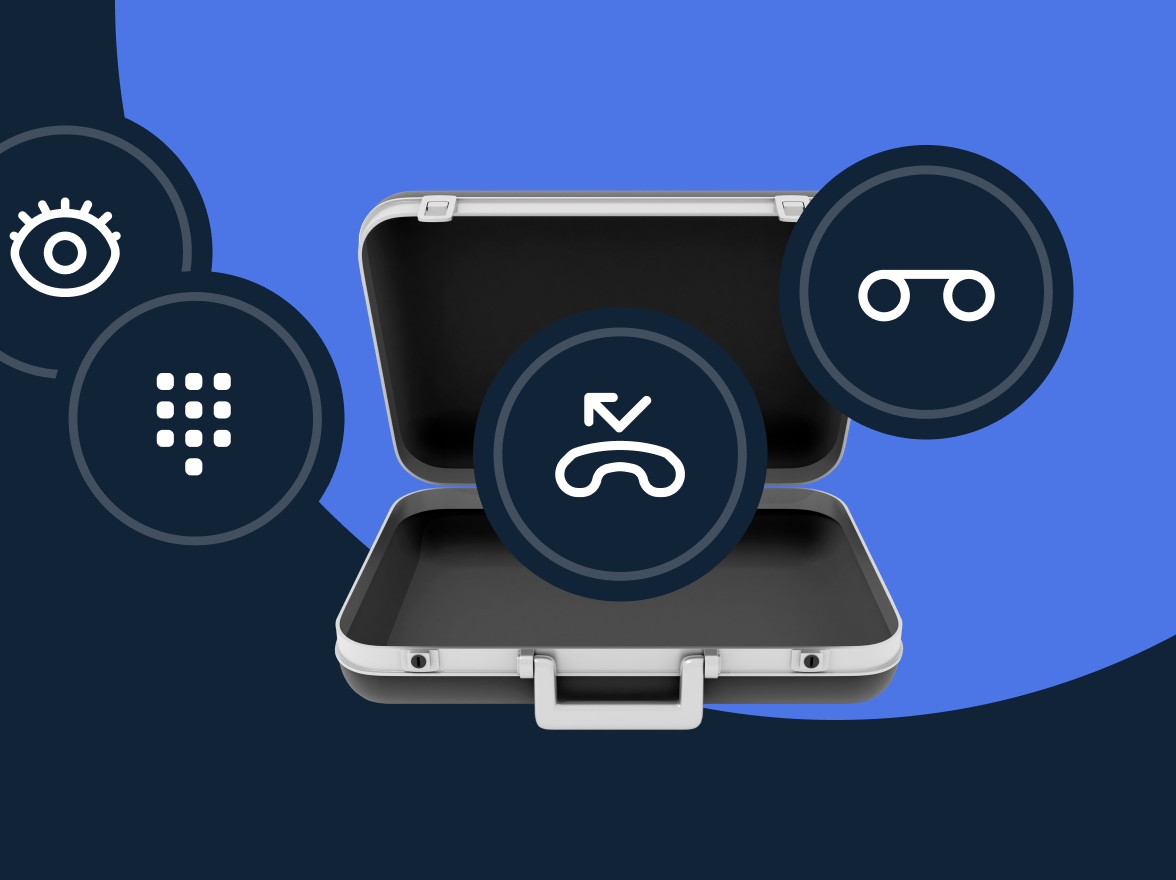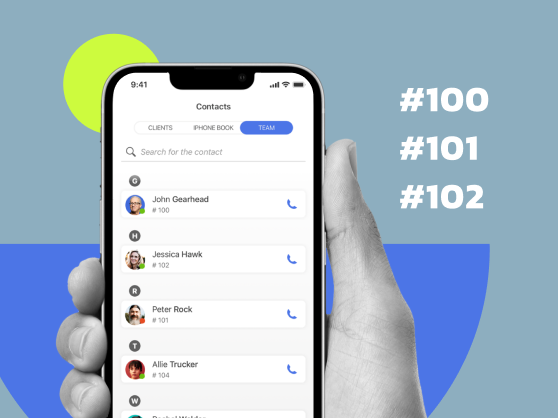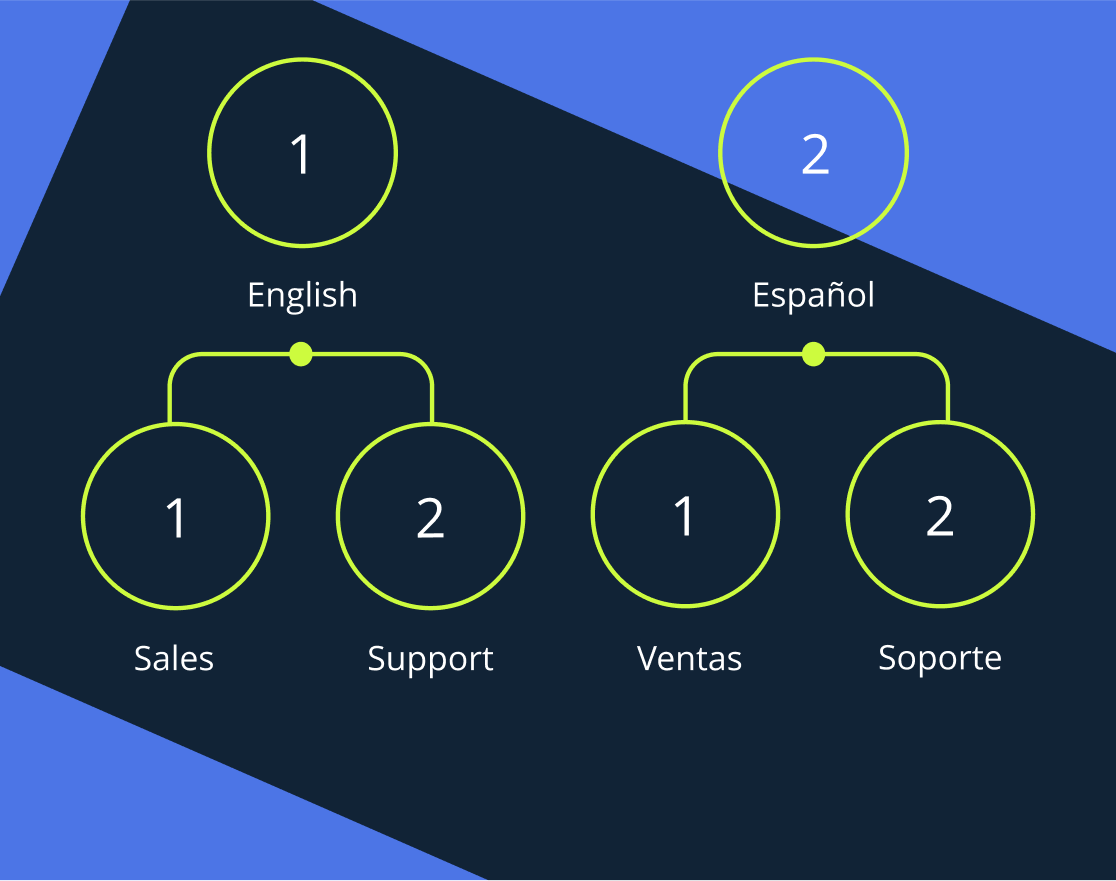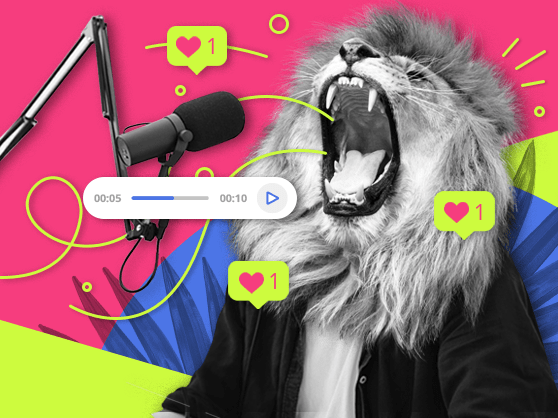When deciding on a phone system for your call center, the importance of one factor cannot be overstated: the range of available features. Using the right features well can supercharge your business and increase your capacity for success.
When combined with VoIP’s power, you can cook something special. Features like call recording, call routing, and call whisper can really make a difference.
To help you imagine what these features can do for you, here we’ll be talking about the top 30 must-have call center application features.
Why you need these essential call center features
It is not an overstatement to say that your service quality can genuinely rest on the call center software you use. Here are just a few reasons why you should consider getting the best:
- You just hired more people: If your business has recently hired a lot more people, getting new call center software features can help you with the organization.
- You have more clients: Have you had a business growth spurt? Fantastic. Using a feature-rich platform can help improve your capabilities.
- You want to get organized: Feeling a little hectic? New features can help your business to stay in order.
- You want to switch to being a BPO: As a BPO, you will essentially be responsible for someone else’s customer service. This means that your success depends entirely on how well you can provide that service; if you get a bad reputation, people will go elsewhere. Having the most popular call center features can help.
- You had to let some people go: Do you actually have less people now? Special features can help with that as well. More features mean less of a load on your workers.
The list of best call center features
- Automatic call distribution (ACD)
- Interactive Voice Response (IVR)
- Call queue
- Call recording
- Call monitoring
- Agent permissions
- Call routing
- Call transfer (cold & warm)
- Preview dialer
- Progressive dialer
- Predictive dialer
- Answering Machine Detection (AMD)
- Local presence
- Call whisper
- Call parking
- CRM integration
- Call center analytics
- Customer callback
- Ring group
- Call barge
- Softphone
- Music on hold
- Deskphones
- Call notes
- AI call summaries
- Three-way call
- Call intercept
- Voicemail to email
- Voicemail drop
- Call log
30 call center phone system features
The following are vital features. Which is the best? Well, after reading, you can decide for yourself.
1. Automatic call distribution (ACD)
Starting off our call center software features list, Automatic call distribution is a great feature and a must-have for call center operators. This feature can automatically send calls to your employees based on a pre-set pattern.
MightyCall allows you to distribute calls using rules, an auto attendant (where callers select whom they’d like to speak with), a group call, or a queue.
2. Interactive Voice Response (IVR)
Another crucial feature of call center functionality is Interactive Voice Response (IVR). IVR helps callers, via voice responses, indicate what they would like to select. This helps solve questions without anyone talking to callers (like office hours and such).
IVR is a key part of MightyCall’s VoIP feature package and can help you organize your call center in unprecedented ways.
3. Call queue
Being a contact center means you will likely have lots of people calling in (“contact” is sort of in the name, after all). If you can’t speak to them all, you’re losing clients and their money. A call queue, however, can help you get to all of them.
MightyCall’s call queue feature lets you inform people waiting on the line about sales, hours, or anything else you’d like them to know about your business.
4. Call recording
When it comes to VoIP, there is not much more fundamental than call recording. It’s a top call center feature, and if you don’t already have it, you need it. This allows you to record incoming calls (if you’re an inbound call center) or outgoing calls (if you’re an outbound call center). You can then save these recordings and access them at a later date.
With MightyCall, you can store unlimited recordings in your phone system.
5. Call monitoring
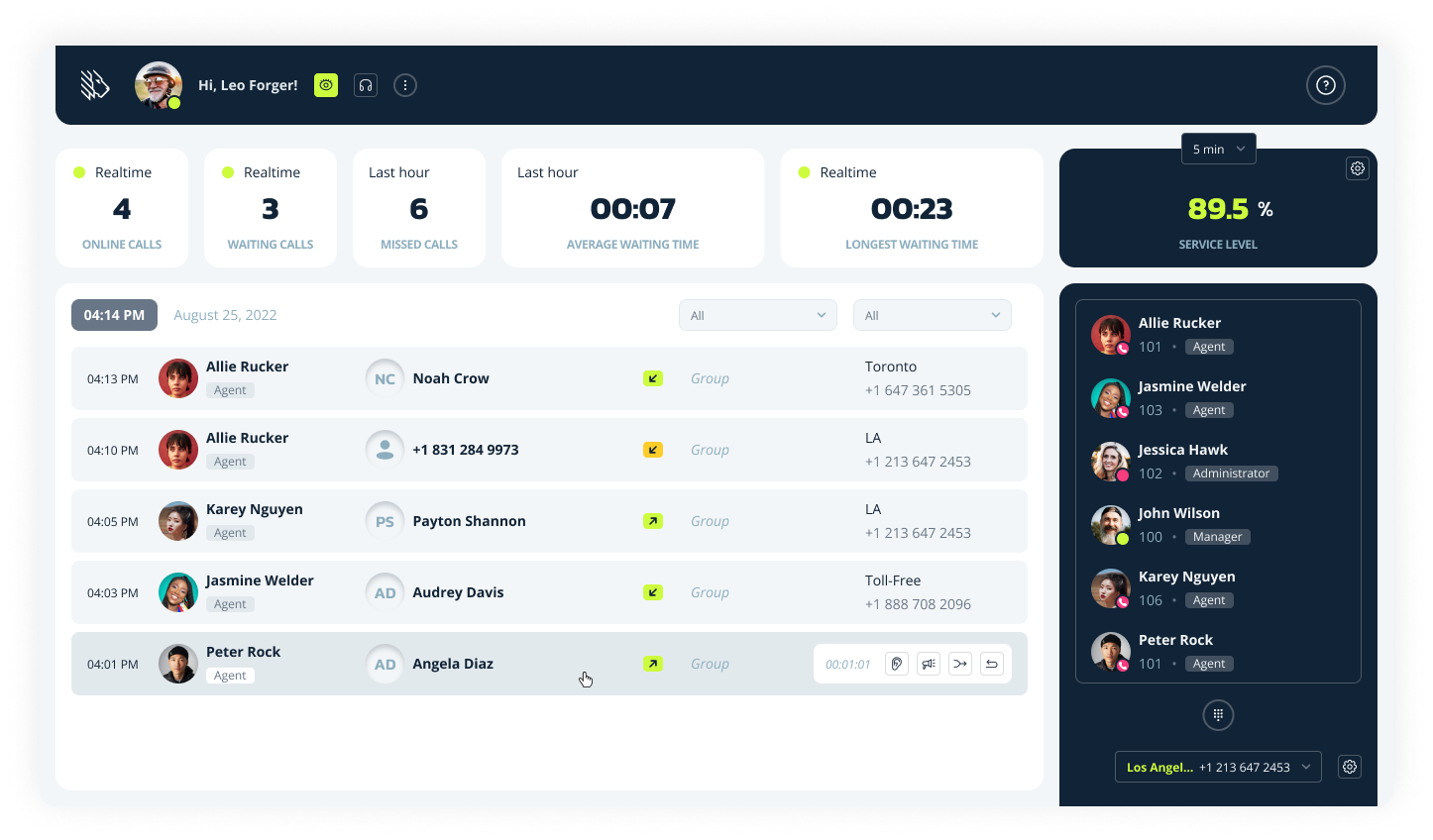
Being aware of what your agents are saying is an important aspect of keeping your call center functionality running smoothly. Not only can a careful manager know when they need to jump in, but they can also help, in real-time, their agents make the sale or help the customer.
MightyCall’s list of telephony features includes different types of call monitoring, such as call listening, barging, and recording.
6. Agent permissions
When you’re working in a call center, you might be working on your own sales – or, if you’re a BPO call center, you’re working on someone else’s. Either way, you’re working with important information, which probably goes through many hands. You make sure that you have the best security possible; VoIP companies are increasingly introducing agent permissions as a feature.
These permissions enable you to decide which of your call center agents see what. This increases security but also increases your ability to streamline work.
7. Call routing
Call routing is perhaps the absolute core benefit of having a VoIP phone number and is probably the top call center phone system feature. This is because it enables you to organize how calls come into you; essentially, you can forge their path ahead of time based on lots of factors, such as:
- Time-based routing: If a call comes in during business hours, systems like MightyCall allow you to send it a certain way. If it comes after them, it can take another path.
- Skill-based routing: Depending on what a caller is calling for (possibly indicated by an IVR response), they will be routed to the agent with skills matching their request.
- Fixed order routing: Here, incoming calls will always go in a specific order, pre-determined by you.
- Percentage: This routing system guarantees that agents will receive a roughly equal percentage of calls.
8. Call transfer (cold & warm)
Being able to transfer calls has been a bedrock feature of modern phone systems pretty much since they have been around. But it’s become an even more important feature of call center systems as companies have expanded their size and their geographic scope.
VoIP companies allow two types of call transfer: cold and hot. The former, cold (from the saying “going in cold”), means that a call is transferred to a person out of the blue without anyone checking in on them first. The latter, warm, allows one agent to contact another before making the transfer.
9. Preview dialer
Being in a busy work environment means needing to reach lots of people quickly. The system should not only help representatives connect efficiently, but also make each interaction meaningful.
A preview dialer ensures reps are fully prepared before the call begins by displaying the customer’s information, interaction history, and relevant notes before dialing. This preparation time allows them to tailor their approach, build rapport, and deliver a personalized conversation instead of jumping in cold. Preview dialing is ideal for high-value sales, complex customer service cases, or B2B outreach, where quality matters more than sheer volume.
10. Progressive dialer
A progressive dialer is built for efficiency while still keeping the pace manageable for agents. Similar to what’s often called a power dialer, it automatically dials the next number as soon as an agent is available. It keeps agents consistently engaged without the complexity of dialing multiple numbers at once, ensuring a smooth flow between conversations.
This method works best for steady-paced outbound campaigns, where maintaining momentum and reducing idle time are key. Progressive dialing strikes a balance between speed and customer experience, helping teams stay productive without sacrificing call quality.
11. Predictive dialer
A predictive dialer takes call center efficiency to the next level by using algorithms to determine the optimal time and number of contacts to dial, then matching those calls with available agents. By dialing multiple numbers per available agent, it significantly increases the chances of connecting with a live contact while minimizing downtime.
In MightyCall’s dialer, you can customize the number of calls made per available agent — from 1 to 10 — allowing managers to instantly adjust pacing to match campaign goals and the engagement level of the contact list. Combined with Answering Machine Detection (AMD), auto answer, National DNC list scrubbing, and an abandon rate customizable metric, it keeps call center agents productive while maintaining full compliance with industry regulations.
12. Answering Machine Detection (AMD)
If an outbound campaign is focused solely on live customer conversations with no interest in leaving voicemails, Answering Machine Detection (AMD) is the tool to enable in your call center software.
Used in progressive and predictive dialer campaigns, AMD automatically skips calls that hit voicemail, so agents only connect with real people. This ensures that their time and energy are dedicated to meaningful customer interactions instead of wasted attempts.
13. Local presence
People are far more likely to answer calls from local numbers, and local presence lets you turn that into your advantage. For large-scale campaigns, this can mean hundreds of additional live connections.
When enabled, the system selects the best number in your account to match the contact’s area code. Calls appear local to the recipient, giving your agents a better chance of making contact and starting a real conversation.
14. Call whisper
Call whispering is a type of call monitoring that allows the manager to hear what is happening in the call. However, there is a key difference: managers can speak (or “whisper”) to the agent while the call is ongoing without the person on the other side of the line hearing it.
Managers can use MightyCall to train new agents or help experienced ones close the deal. Alternatively, they can simply choose to listen.
15. Call parking
On the surface, call parking may seem similar to the call transfer feature. The call starts with one agent and ultimately ends up with another one. However, that is where the similarities end. With the transfer, the call goes from one person to another.
With parking, the call goes into a group of calls (think a parking lot), which can then be selected by an agent. This is helpful if you have an initial agent who can then send the call to a sales or customer service department, where it can be picked up by the first available caller.
16. CRM integration
One of the fundamental contact center features of the modern era is the ability to integrate with CRM, which stands for Customer Relationship Management. These tools can help you connect your call center software with the CRM tools you love, essentially turning them into call center software features.
Different phone systems offer different integrations. MightyCall offers integration with Hubspot, Zapier, Salesforce, and more!
17. Call center analytics
With the chaos that goes into running a contact center, ensuring functionality is key. A great way to do that is to have an overview. Some places call it analytics (MightyCall calls it a dashboard), but they all essentially operate the same. These call center features allow you to have an overview of everything going on in your center: calls made, calls missed, call time, who is talking, when they talked, etc.
18. Customer callback
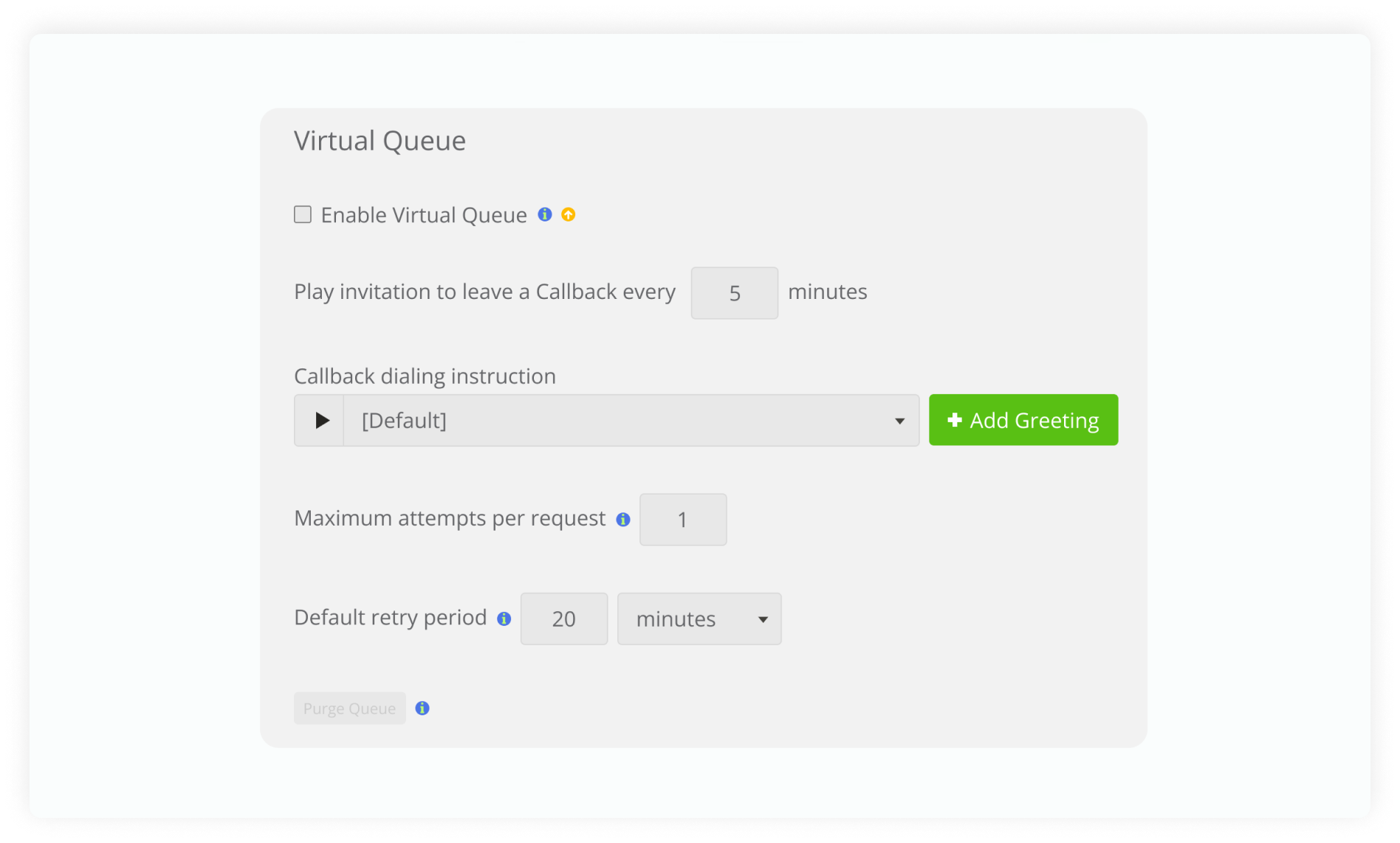
The callback feature may be useful, but some folks still don’t like to wait in line. For those who don’t, there’s the Customer Callback. It’s one of the best call center phone system features, offering customers the ability to request a callback. Here, callers waiting on hold have the option to leave while saving their spot in line; when it comes to their “turn,” the system automatically dials their number.
When paired with MightyCall’s other features, it allows you to save time by addressing the calls that absolutely need to be addressed while also being able to call the folks back later who can wait a while when your agents have time.
19. Ring group
Another fantastic way to reduce wait times is the Ring group feature. Here, incoming callers are redirected to a group of agents instead of a single person. Then, their call can be answered more quickly.
MightyCall offers this on their call center features list. When combined with other routing techniques, it can be a powerful tool.
20. Call barge
Let’s face it: sometimes, calls just aren’t going well. It may not be your agent’s fault; they may be dealing with an aggressive customer, or they may be dealing with a situation they’re unsure of and, for whatever reason, can’t transfer at the moment.
That’s why some VoIP companies, including MightyCall, offer call barging. This feature lets you “barge” into a call and address the customer, quickly settling any potentially dicey situation.
21. Softphone
Softphones are perhaps the best call center feature because they encapsulate the promise of VoIP. The softphone lets users make calls on a phone in the computer, as opposed to a hardphone.
It can be its own program, or it can be part of a browser.
22. Music on hold
Waiting for calls can be frustrating, and as we’ve discussed, it can be a reason callers drop out. That’s why hold music is a classic but important part of call center system features.
MightyCall offers the ability to have your own hold music.
23. Deskphones
Look, some businesses are more old-fashioned. Maybe you bought a building with many old-fashioned desk phones, or you just prefer that to having your people stare at computers.
Either way, some companies like MightyCall allow you to integrate modern call center features with desk phones.
24. Call notes
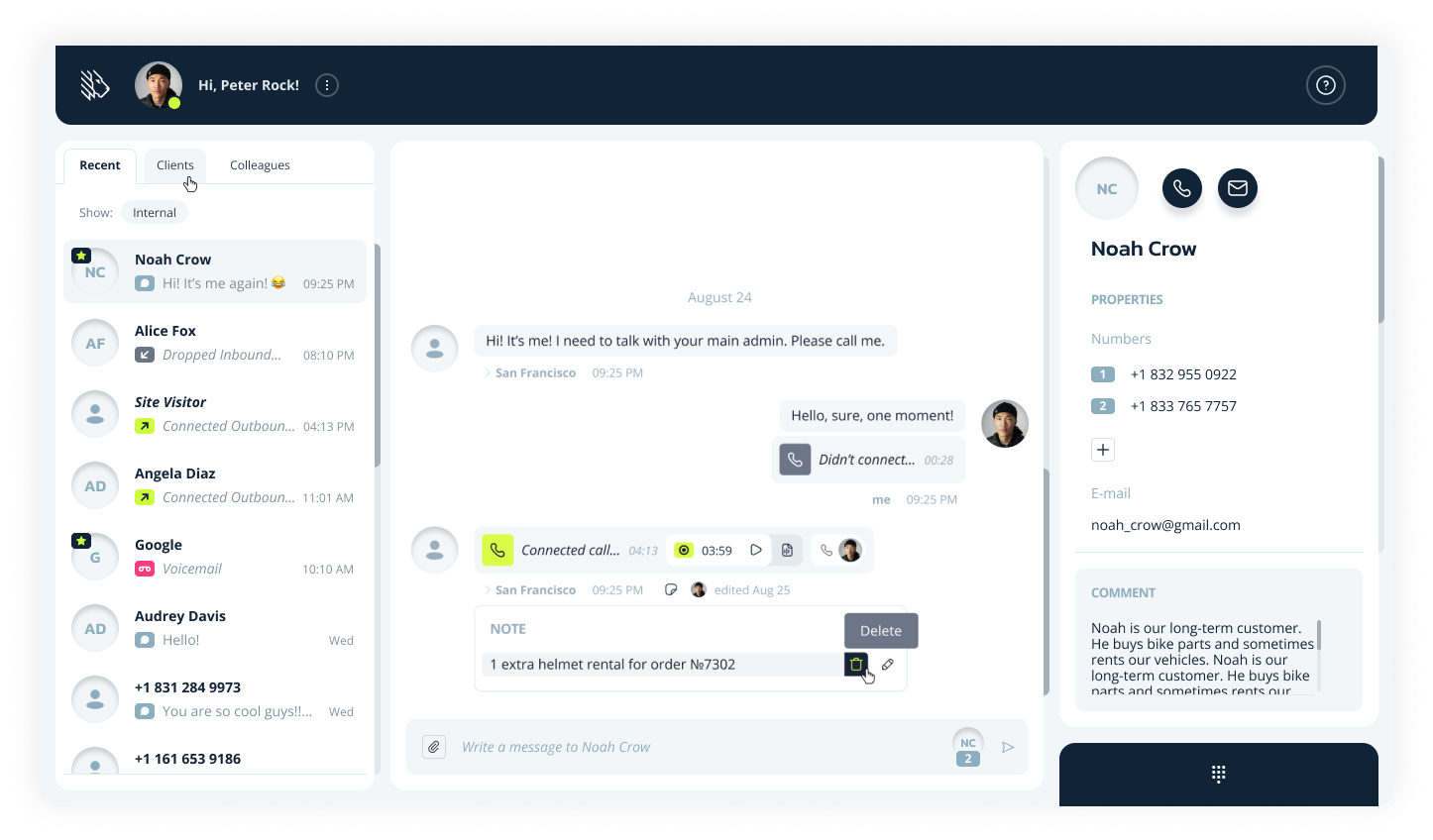
Call notes may seem like an old-fashioned contact center feature – but how else are your agents going to be able to remember the content of their calls? What about calls they never partook in?
But with MightyCall’s call notes feature, agents can leave memos for themselves and for future agents who may have to interact with a client. Notes can include anything: what went on, things about the customer to keep in mind, what they ordered, etc.
25. AI call summaries
Listening to full call recordings just to find a few details can be time-consuming. AI-generated call summaries solve that by automatically creating a short snippet of what was discussed.They help supervisors and agents quickly understand the conversation without replaying the entire recording, making follow-ups and reporting much easier.
In MightyCall they are located in the call log, these summaries are available for any call lasting longer than 25 seconds.
26. Three-way call
Two heads are better than one – but sometimes, three heads are better than two. Being able to quickly include a third person in the call can greatly help – bringing in an expert across your company in a subject or by simply having a three-way chat.
When combined with MightyCall’s other powerful tools, like call notes, three-way calls can be very helpful.
27. Call intercept
If call barging allows the manager to enter a call, call intercept is a feature of a business phone system that takes it a step further by allowing the manager to barge into a call while also kicking the agent off. This is obviously a tool of last resort, but it can be a necessary one if a call has really gone south.
Maybe a caller is seriously disrespecting your agent, or maybe your agent needs to take a few steps back. Either way, MightyCall offers this feature so that you can be prepared for any situation.
28. Voicemail to email
Do you have a call center that sometimes relies on email or usually can’t pick up the phone (maybe you’re only using an outgoing call center phone system)? Being able to read voicemails in email can save serious time, allowing your agents to simply read and respond instead of having to listen to long and sometimes meandering messages.
When you combine it with MightyCall’s other email-based features (like auto-emailed transcripts), your inbox can become a bigger part of your operation. It’s important to think of the features in a call center as interlocked, able to work together to provide you with the best solution.
29. Voicemail drop
A big chunk of calls goes to voicemail, especially in high-volume campaigns, and voicemail drop is one of call center capabilities that allows agents to use that to their advantage.
Agents can create a library of pre-recorded voicemails and drop them with a single click when they reach voicemail. No more wasting time recording the same message over and over and, while the system delivers it, agents keep calling. This ensures consistent messaging and eliminates the risk of saying something wrong.
30. Call log
It’s a no-brainer for a call center to have all its calls in one place. That’s why call logs round out our list. A call log can help your agent remember who and when they called someone, and when it’s shared with others, it can smooth out changes in things like work shifts.
What is a call center system?
A call center phone system links the agents in a call center both internally (to each other) and externally (to the outside world). It allows them to make and receive business calls. When paired with modern call center features, it can increase the working capacities of agents and make them even more productive.
How much does a feature-rich call center system cost?
When it comes to getting a system with all the necessary call center phone system features, the price will wildly vary depending upon multiple things:
- What feature set do you want?
- How many agents do you have?
- How often will you be using the service?
- Do you want a specific phone feature, or do you want as many as possible?
The lowest on the market you’ll probably end up paying is around $25 per user per month, though that will be extremely restrictive. The highest could be well into the low hundreds.
Top call center systems
MightyCall
MightyCall is a premier call center VoIP option. With years of experience and dozens of key features of call center phone systems, it should be one of your top choices.
Best for
MightyCall’s call center solution is best for SMBs and call centers.
Price
MightyCall has three pricing tiers:
- Core: $25 per user per month
- Pro: $38 per user per month
- Power: Contact them
- Enterprise: Contact them
What users have to say
Pros and Cons
| Pros | Cons |
|---|---|
| All major call center phone systems features are available | The call dialer is unavailable |
| Managerial control is easily exertable with call whisper and barging | No ability to park calls |
| Flexibility is a big plus: older desk phones and modern softphones work on this service | |
| Teamwork is very easy |
schedule your personalized demo with our amazing team

Aircall
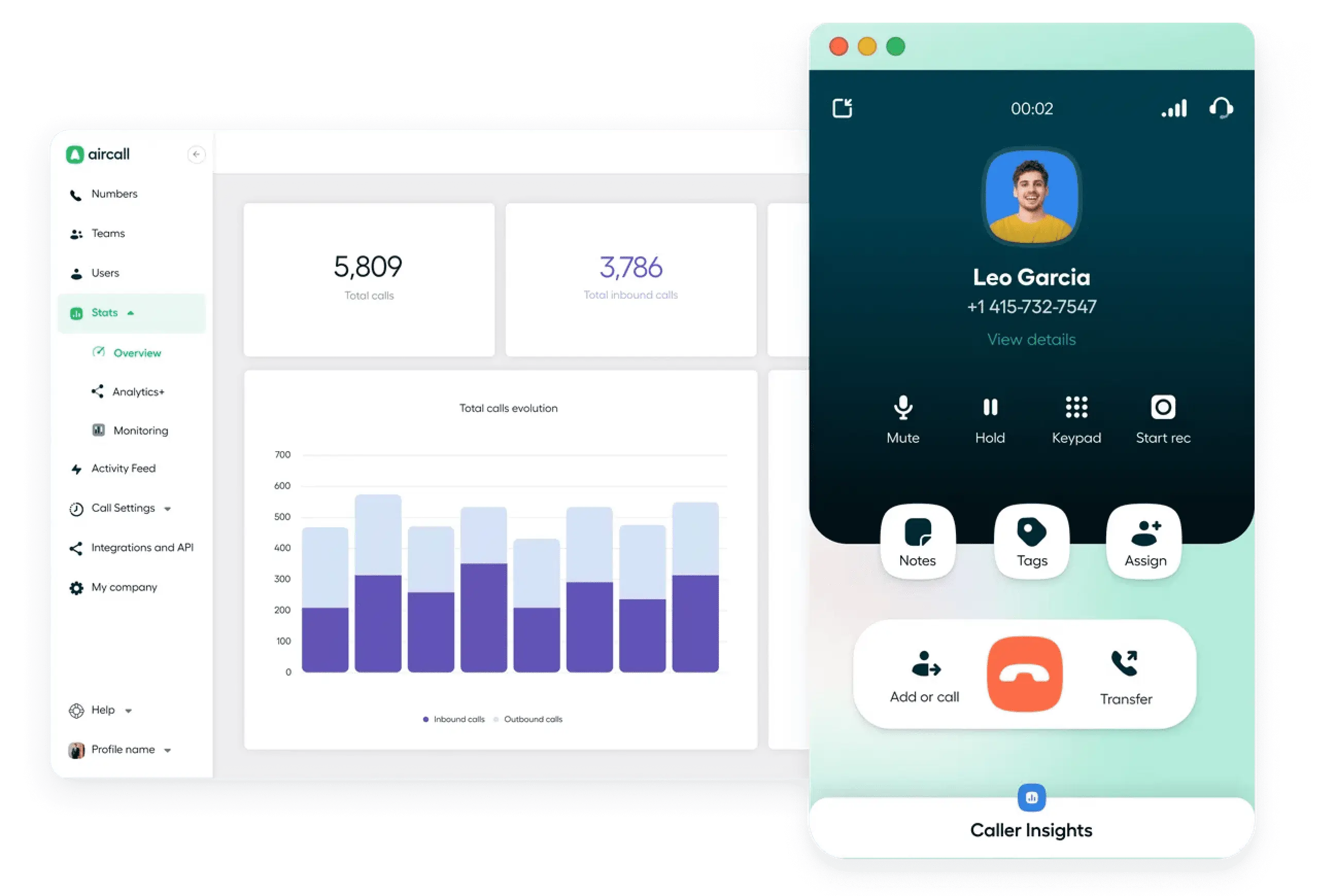
Aircall is a cloud-based call center solution. They are also helpful for call centers, boasting CRM (a big feature of business phone companies) integration, analytics, and, of course, call routing.
Best for
Aircall is best for small to medium-sized businesses.
Price
Aircall has three pricing tiers:
- Essentials: $30 per user per month
- Professional: $50 per user per month
- Custom: Contact them
What users have to say:
Pros and Cons
| Pros | Cons |
|---|---|
| Extremely easy to set new agents up on the platform | Call parking is not an option |
| CRM integration is very useful | The price is higher than the others |
| Extensions easy to use and assign |
Dialpad
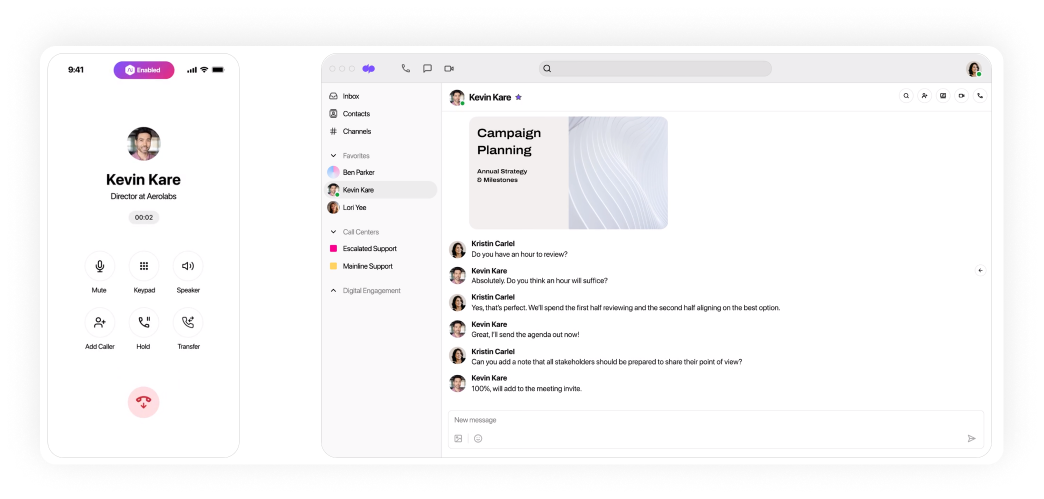
Dialpad offers settings for smaller businesses as well as call center phone systems features. They have key features and heavily rely on using AI technology to help their users.
Best for
Dialpad is best for call centers.
Price
Dialpad has three pricing tiers:
- Standard: $15 per user per month
- Pros: $25 per user per month
- Enterprise: Contact them
What users have to say
Pros and Cons
| Pros | Cons |
|---|---|
| AI technology sets them apart from the competition and can be useful | However, AI technology can also be more complex for those who want simpler features in a call center |
| Can track conversations across multiple apps | Have been accused in some reviews of having hidden fees |
| The ability to scrape data sources is rather a unique option | Removing licenses can be expensive |
Tips for selecting the best call center software features
Choosing the right call center software isn’t just about ticking off a list of features. It’s about finding the perfect fit for your team and customers. Start with the essentials: great, easy-going, and knowledgeable support, intelligent call routing, and real-time analytics. But don’t stop there! Look for CRM integrations and workforce management tools to keep things efficient.
Scalability is key; your software should grow with you. Never underestimate the power of a user-friendly interface; productivity will suffer if your agents struggle with clunky software. Lastly, prioritize security and compliance to protect sensitive customer data.
Use strong features of a call center for better communications
The best call center software features depend on your specific needs. If you handle high call volumes, intelligent routing and IVR can improve customer interactions. Need a personal touch? CRM integration ensures agents have customer details at their fingertips. Real-time analytics help managers make data-based decisions. For remote teams, cloud-based solutions and omnichannel support keep communication seamless. Security features are a must for businesses handling sensitive data.
The right call center software features should make life easier, not harder!



